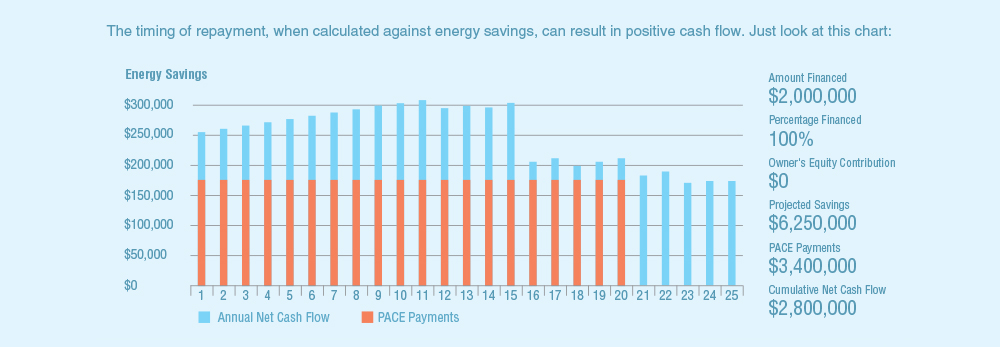What is C-PACE and how can it pay for my clean energy project?
Kristi Ennis, AIA, LEED AP BD+C
 Commercial Property-Assessed Clean Energy (C-PACE) is a tool for states and cities to encourage private property owners to invest in water- and energy-efficiency and clean energy projects. It is a voluntary program that allows owners to finance those projects by repaying the loan over time with assessments added to property tax bills.
Commercial Property-Assessed Clean Energy (C-PACE) is a tool for states and cities to encourage private property owners to invest in water- and energy-efficiency and clean energy projects. It is a voluntary program that allows owners to finance those projects by repaying the loan over time with assessments added to property tax bills.
How is this different from a loan?
Like a traditional loan, the funds are provided by private capital. Unlike a traditional loan, the program offers competitive interest rates with payment over terms as long as 30 years, as opposed to 7-10 years for commercial loans.
In addition, repayment obligations typically remain with the current owner, allowing building owners to make improvements without the need for payback before sale or refinancing.
What kinds of things do C-PACE programs fund?
- Energy management systems
- High-efficiency chillers, boilers, and furnaces
- Energy recovery systems
- High-efficiency lighting
- Building envelope improvements
- Combined heat and power systems
- Fuel cells
- Wastewater onsite reuse systems
- Water conservation fixtures and equipment, including irrigation
- Solar hot water, solar photovoltaics, and small wind systems
- Green roofs
- Resilience improvements
What other advantages are there?
PACENation attempts to keep an up-to-date map of available C-PACE programs, although the industry is rapidly evolving. DSIREUSA may be more up-to-date and provides links to the individual programs. The Colorado PACE website has a county-by-county map of those who have approved it, and those that are in discussion. A fair amount of California has access, and LA County has their own program. Texas PACE Authority serves all Texas counties that have opted in.
What costs are included in the financing?
Most programs include engineering & design, permit, construction, commissioning, energy audit, and measurement and verification costs in their eligible expenses. They also fold in the program application and administrative fees.
I’ve been hearing about PACE in the news. Is C-PACE currently at risk of being discontinued?
Residential PACE programs have run into some roadblocks and may be suspended in some areas. These barriers have not been an issue for commercial projects; C-PACE is likely to continue.
You can also download a printable pdf version of this article here.
